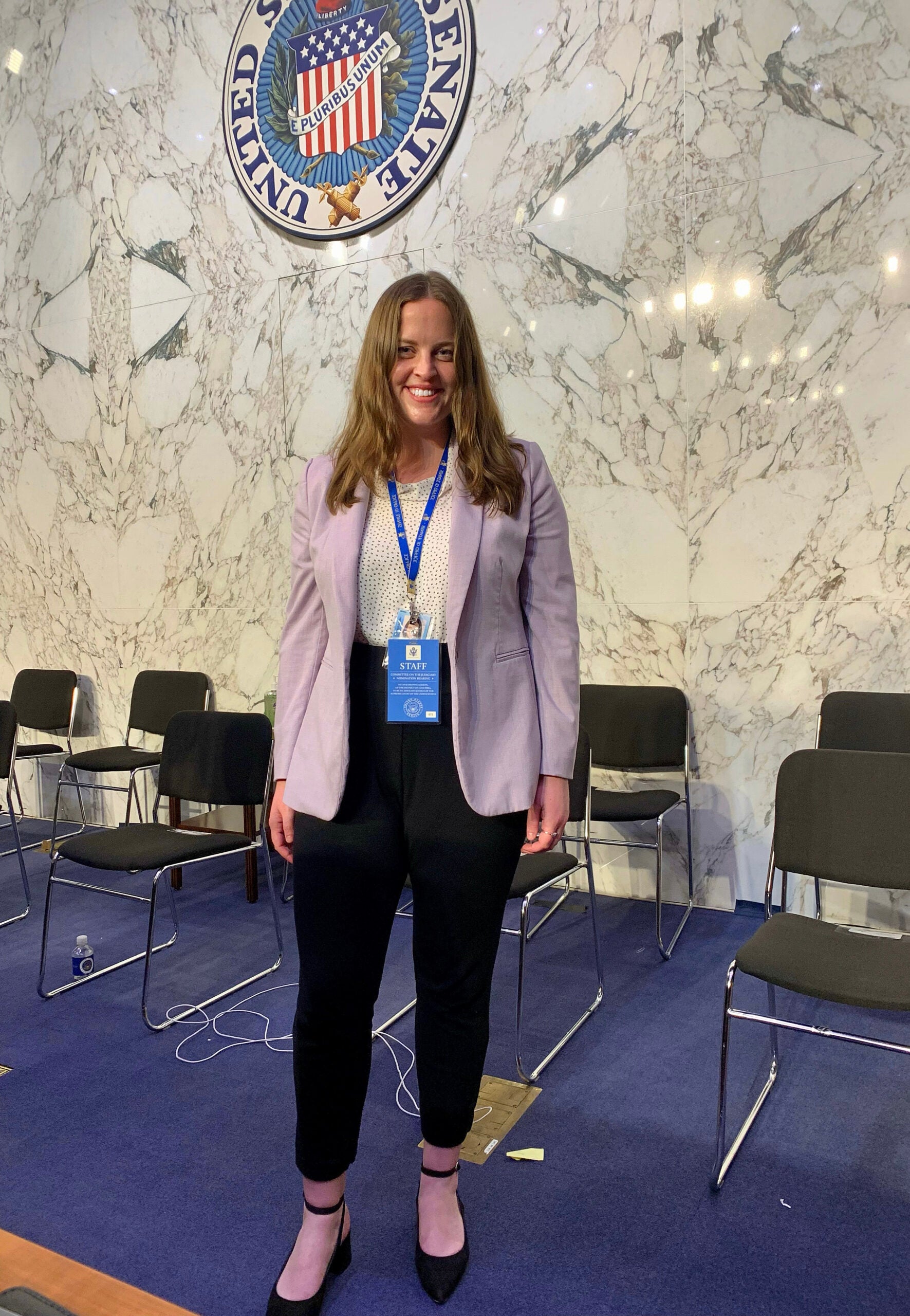
By Maggie Hopkins ’25
By the time I departed the U.S. Senate Judiciary Committee in July 2022 to start law school at HLS, I had assisted in the confirmation of more than 70 Article III judges—including one Supreme Court Justice, Justice Ketanji Brown Jackson, and 54 district court judges. As the Nominations Clerk to Judiciary Chair Dick Durbin, it was my job to assist counsels in preparing the Democratic Senators for nominations hearings and track all things judiciary—keeping an eye on vacancies, nominations, and the floor confirmation calendar.
I sometimes like to imagine who had this job exactly thirty years ago—and who was tracking and assisting in Judge Patti Saris’ confirmation to the United States District Court of Massachusetts. I spent the fall 2023 semester interning for Judge Saris (who still actively sits on the District Court and celebrated thirty years on the federal bench in November) through the Judicial Process in Trial Courts Clinic. Though I went into my internship with a perhaps-overly-in-depth understanding of the federal judiciary as a whole, I knew next to nothing about the day-to-day operations of an individual judge’s chambers. I consider myself immensely lucky that I had the honor of learning this from Judge Saris.
My first learning opportunity in chambers was an interesting one—my first day happened to coincide with the sentencing of a Russian hacker who had participated in a scheme that fraudulently traded upwards of $90 million. I walked into the courtroom, sat down at a table with Judge’s three clerks and two other interns, and watched Judge Saris carefully and thoughtfully walk through the sentencing process as members of the media and the public looked on from the gallery. I was immediately struck by her intellect but also her decency, treating the defense, defendant, and prosecution with kindness and clarity. The sentencing ended, and all of us on Judge Saris’ chambers team walked out of the courtroom together before stopping to debrief in a private area. Judge Saris asked us for our thoughts before explaining her sentencing thought process to us, asking if we had any questions.
I found this approach remarkable. Why would Judge—who has served on the federal bench for decades and was Chair of the U.S. Sentencing Commission—care what her young clerks and interns thought? But I quickly learned this was not novel for her, and after leaving each and every proceeding in her courtroom, she takes the time to discuss the matter with her staff, from her newest intern to her most senior clerk. She prioritizes creating a chambers environment broadly conducive to doing and promoting justice, but also promoting learning.
After that first day, I learned quite a lot very quickly through both observing courtroom proceedings and assisting Judge Saris’ law clerks in evaluating the cases on Judge’s docket. I took what I had learned in 1L Civil Procedure and put it into practice, analyzing many motions to dismiss. The motions involved a wide breadth of subject matter, ranging from real estate settlements to data breaches. I had the opportunity to research case law and write legal memos, and I always felt like my effort was both impactful for me from a learning standpoint and helpful for Judge Saris and her law clerks as they considered cases. Finally, I was pleasantly surprised by just how important Judge Saris’ law clerks became to me. Two of her three current clerks are HLS alums themselves, so not only did they mentor me over the course of my internship relating to the work of chambers, but they also became mentors who gave me course advice, law school tips, and general support.
Though I am only halfway done with law school as I write this, it will be tough for any other experience at Harvard to be as impactful and wonderful as my internship with Judge Saris. She is a phenomenal judge and mentor, and without the Judicial Process in Trial Courts Clinic, I doubt I would have had this experience.
Filed in: Clinical Student Voices
Tags: Class of 2025, Judicial Process in Trial Courts Clinic
Contact Office of Clinical and Pro Bono Programs
Website:
hls.harvard.edu/clinics
Email:
clinical@law.harvard.edu